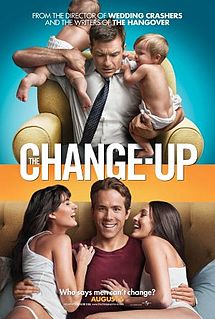
THE CHANGE-UP
US, 2011, 118 minutes, uncut, 112 minutes, cut, Colour.
Ryan Reynolds, Jason Bateman, Leslie Madden, Olivia Wilde, Alan Arkin.
Directed by David Dobkin.
With the advertising tagline, ‘From the director of The Wedding Crashers and the writers of The Hangover’, one would think that more than enough consumer information was offered for discerning filmgoers. The tagline is not false advertising.
For a while, over several decades, there was a series of comedies where two characters took each other’s personality while still looking their original selves. These tended to be father-son changes (Like Father, Like Son or Vice Versa) or mother-daughter changes (Freaky Friday). This time it is two middle aged men. One is a very successful married lawyer with children (Jason Bateman doing his now familiar thing as the put-upon businessman) and the other is an irresponsible womanising loser (Ryan Reynolds doing what he used to do in crass comedies like Waiting, Buying the Cow or Van Wilder, Party Liaison).
We know where we stand (or where we sit). There are lots of situations which we might have thought up had we been asked to write a screenplay. The loser has to become responsible (not very good at it at all, goofing in the office and cavalier with feeding crying babies during the night...). Ryan Reynolds is a good enough actor to be able to do both incarnations of his character. Not so sure about Jason Bateman being let loose (and he is tempted to become quite loose at times). Even acting irresponsibly, he is not quite credible or persuasive.
There are some funny sequences as you might imagine (and Alan Arkin turns up as the loser’s father). I am indebted to reviewer Tom Ryan of The Sunday Age for providing me with an adjective for this review and for future use. There certainly are some crass moments and jokes, but a lot of it is more basic, bodily functions and pooping babies etc. The word for this kind of humour and treatment is ‘tacky’.
It’s an American comedy of middle age and, as usual, with Judd Apatow comedies and the like, there is traditional moralising at the end. (And Jason Bateman’s wife is actually played by Leslie Mann who is the real Mrs Apatow.)
1. American-style raucous comedy? A serious underlying point about the possibilities for looking at selves and changing perspective? Changing?
2. The American city, families, business, offices, clubs? The musical score?
3. The popularity of films where characters interchange interiorly but keep the same externals? The title?
4. The establishing of the two characters, Ryan Reynolds and Jason Bateman and their careers and comic styles? David, lawyer, wife and children, a more serious type? The contrast with Mitch, actor, freewheeling, womaniser?
5. The situation, out together, drinking, urinating, envious of each other’s lifestyle, wishful thinking the transformation? The results? The serious character in a more promiscuous situation? The loose character in a more serious situation and relationships? Responsibility and irresponsibility? And their searching for the fountain so that they can change again, its being removed, the search – but the final wake up and back to themselves? Different selves?
6. Dave, in Mitch’s situation, expectations of him? Taking the day off, the aquarium, watching the movie, the risk of compromising situations? Dave trying to tell his wife in the truth but her not believing? Mitch in Dave’s situation, at home, gradually taking responsibility for the children, Dave’s wife, talking with his father and getting advice, his bungling things at the office with the deals, but interested in Sabrina, the date, Dave’s advice?
7. Dave, his being made a partner, the celebrations, Mitch present, Mitch upset about not being invited to the anniversary party and learning that Dave thought he was too wild?
8. Sabrina, at work, the crush on Dave, the encounters with Mitch?
9. Dave, his wife, devotion, the children?
10. Each waking up, back to themselves? What had each of them learnt about themselves, about each other, an approach to life, and approach to responsibility?